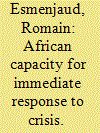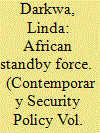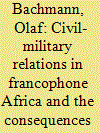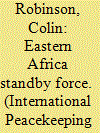|
|
|
Sort Order |
|
|
|
Items / Page
|
|
|
|
|
|
|
| Srl | Item |
| 1 |
ID:
131096


|
|
|
|
|
| Publication |
2014.
|
| Summary/Abstract |
The creation of an African Capacity for Immediate Response to Crisis (ACIRC) is a sign of Africa's willingness to take its destiny into its own hands. Presented as a reaction to the slowness of the development of the African Standby Force (ASF), it is also a response to some of the ASF's conceptual weaknesses. This decision reflects a wish to establish an instrument better equipped to deal with the challenges Africa is facing. Departing from the (sub)regional logic of the ASF results from a desire to take into account the transnational nature of threats, while its enlarged mandate is meant to offer Africa the capacity to intervene in all kinds of conflicts, including by undertaking peace enforcement activities. But the obstacles on the road towards the actual creation and mobilisation of this capacity should not be underestimated. These include material difficulties, but also political tensions, between 'small' and 'big' states as well as between the African Union and subregional organisations. The risk then is high that the ACIRC, whose announcement came as a reaction to France's intervention in Mali, ends up joining the ranks of the many 'anti-imperialist' phantoms haunting the history of the Organization of African Unity/African Union (OAU/AU). Confronted by events considered 'neocolonial' initiatives, African actors have indeed traditionally reacted by launching grand projects that never got off the ground. However, by actually establishing this new instrument, they may also demonstrate that times have definitively changed.
|
|
|
|
|
|
|
|
|
|
|
|
|
|
|
|
| 2 |
ID:
156092


|
|
|
|
|
| Summary/Abstract |
Declared operationally ready in 2016, the African Standby Force (ASF) has not been deployed in its originally designed form. This is not for the lack of opportunities but rather a demonstration of the power of the Regional Economic Communities/Regional Mechanisms (RECs/RMs) – Africa’s sub-regional security structures – over matters of peace and security. Experience gathered from its short existence suggests that the ASF may never be deployed in its current form. It may instead evolve into a robust framework, adaptable mainly by the RECs/RMs, for addressing varied security challenges. Four things are critical to enhancing the utility of the ASF: the political willingness of the RECs/RMs, the strategic interest of the member states, predictable and sustainable financing, and clarity on the role of the African Capability for Immediate Response to Crisis, the temporary battlegroup that was created to provide the African Union with a rapid response capability, pending the ASF’s operationalization.
|
|
|
|
|
|
|
|
|
|
|
|
|
|
|
|
| 3 |
ID:
132271


|
|
|
|
|
| Publication |
2014.
|
| Summary/Abstract |
The Building Security Overseas Strategy is at its core an 'Intervention to end all Interventions' - from a Western as well as an African perspective. Two of its main pillars are security sector reform in specific countries and systematic support to the development of the African Peace and Security Architecture. This article addresses the question why such efforts have met little success in francophone Africa. It argues that the failure of Western advisers to understand the sociological dynamics of African armed forces, shaped by a political culture based on personal loyalty to the leader, is at the root of the problem. In that context, the Huntingtonian-type distinction between the civilians and the military does not apply as military and civilians act in concert within common clientelism systems. As a result of the curtailing of the state-formation experience in most African countries, the military never had to demonstrate its performance as a state builder, nor did it have to bargain its legitimacy against the support of the citizens. Partnership in that context will remain a misnomer, at least until African military can credibly demonstrate commitment to state-building grounded in a broad-based social contract.
|
|
|
|
|
|
|
|
|
|
|
|
|
|
|
|
| 4 |
ID:
131101


|
|
|
|
|
| Publication |
2014.
|
| Summary/Abstract |
The Eastern Africa Standby Force is one of the five planned regional forces of the African Standby Force (ASF). Since February 2004 work has been underway to raise an Eastern Africa brigade to operational status. However, Eastern African states may prefer to solve their security problems in a unilateral military fashion, rather than through the integrated model of the ASF. Resources, as always in Sub-Saharan Africa, are scarce, operational capability appears to be growing only slowly, and significant training and airlift problems are unsolved. As these problems are common to all five brigades, some thoughts are presented in the conclusion to provide a simplified ASF way forward.
|
|
|
|
|
|
|
|
|
|
|
|
|
|
|
|
|
|
|
|
|